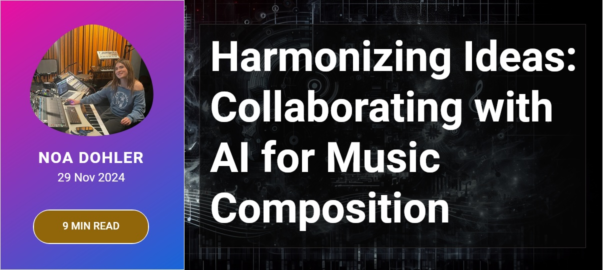Mubert AI transforms music creation beyond human imagination.
In the rapidly evolving landscape of music technology, AI-powered tools are revolutionizing how we create and experience sound. From innovative composition software to groundbreaking production techniques, these tools are reshaping the future of musical expression.
During a recent live performance, I experimented with Mubert AI as a backing track generator. The audience was amazed when I revealed that the intricate ambient soundscapes accompanying my piano improvisation were created by artificial intelligence. It was a magical fusion of human and machine creativity.
The Revolutionary Impact of Mubert AI in Music Creation
Mubert AI has emerged as a groundbreaking force in music composition, leveraging advanced algorithms to generate unique soundscapes in real-time. According to recent reports, the platform has generated over 100 million tracks, matching Spotify’s entire catalog. This massive output demonstrates the tool’s capability to produce diverse musical content across 150+ genres.
The platform’s sophisticated AI architecture enables it to understand and interpret musical patterns, creating compositions that maintain coherence while offering unprecedented variety. By analyzing vast datasets of musical elements, Mubert AI can generate context-appropriate tracks for various applications, from streaming content to commercial use.
What sets Mubert AI apart is its ability to create royalty-free music instantly, addressing a crucial need in content creation. The system’s intuitive interface allows users to generate custom tracks through simple text prompts, democratizing music production for creators regardless of their musical background.
Crafting Perfect Atmospheres with AI Lofi Generation
The AI Lofi Music Generator represents a significant advancement in atmospheric music creation. Content creators are now able to generate endless streams of lo-fi music, perfectly suited for studying, relaxation, or background ambiance.
This technology excels in maintaining the characteristic elements of lo-fi music – the warm, nostalgic sound, subtle imperfections, and relaxing rhythms. The AI analyzes countless hours of lo-fi music to understand the genre’s nuances, from drum patterns to chord progressions, ensuring authentic-feeling outputs.
The generator’s ability to produce consistent quality while maintaining variety has made it an invaluable tool for content creators, particularly those managing streaming channels or needing background music for videos. Its user-friendly interface allows for quick generation of unique tracks while maintaining the beloved lo-fi aesthetic.
Breaking Creative Boundaries with AI Music Solutions
AI music solutions are revolutionizing the creative process by offering unprecedented tools for musical exploration. Through sophisticated machine learning algorithms, these platforms analyze vast libraries of musical data to generate innovative compositions that push traditional boundaries. Text-to-music applications have emerged as a particularly exciting frontier.
These solutions enable artists to experiment with new sonic territories previously unexplored. By processing complex musical patterns and structures, AI can suggest unique combinations of elements that human composers might not naturally consider. This leads to fresh perspectives and novel approaches to composition.
The technology’s ability to learn from user feedback and adapt its output accordingly creates a dynamic creative environment. Musicians can iterate quickly, testing different ideas and directions while maintaining their artistic vision. This collaborative approach between human creativity and AI capabilities is fostering a new era of musical innovation.
The Synergy of Human Artistry and AI Technology
The integration of human creativity with AI technology has created a powerful new paradigm in music production. Through tools like Mubert AI, artists can now augment their creative process with intelligent algorithms that enhance rather than replace human input. Modern AI music platforms serve as sophisticated collaborators, offering suggestions while preserving the artist’s unique voice.
This harmonious relationship between human and machine enables composers to focus on the emotional and artistic aspects of their work while AI handles technical complexities. The technology excels at generating variations, exploring harmonic possibilities, and maintaining consistency across long-form compositions, all while following the artist’s creative direction.
The result is a more efficient and expansive creative process that maintains the essential human element in music creation. Artists can leverage AI’s computational power to experiment with complex musical ideas while ensuring their personal artistic vision remains at the forefront of the final composition.
Future Innovations in AI Music Creation
Emerging opportunities exist for companies to develop AI-powered music education platforms that adapt to individual learning styles and skill levels. These platforms could offer personalized composition tutorials, real-time feedback, and collaborative features that connect students with professional musicians worldwide.
Startups could focus on creating specialized AI tools for specific music genres or cultural traditions, preserving and evolving musical heritage through technology. This might include developing algorithms that understand and generate authentic cultural music styles while respecting traditional elements.
There’s potential for developing AI-driven music therapy applications that generate personalized therapeutic soundscapes based on biometric data and emotional states. This could revolutionize mental health treatment and wellness programs, creating new revenue streams in healthcare and wellness industries.
Shape the Future of Music
The convergence of AI and music creation opens endless possibilities for artists, producers, and enthusiasts alike. Whether you’re a seasoned composer or just beginning your musical journey, these tools are ready to enhance your creative process. What unique sounds will you create with AI as your collaborator? Share your experiences and join the conversation about the future of music creation.
Essential FAQ About AI Music Creation
Q: How does Mubert AI generate music?
A: Mubert AI uses machine learning algorithms to analyze musical patterns and generate original compositions in real-time, having created over 100 million tracks across 150+ genres.
Q: Can AI-generated music be used commercially?
A: Yes, platforms like Mubert AI offer royalty-free music that can be legally used for commercial purposes in content creation, streaming, and business applications.
Q: Will AI replace human musicians?
A: No, AI serves as a collaborative tool to enhance human creativity rather than replace it, offering new possibilities for musical expression and production.
